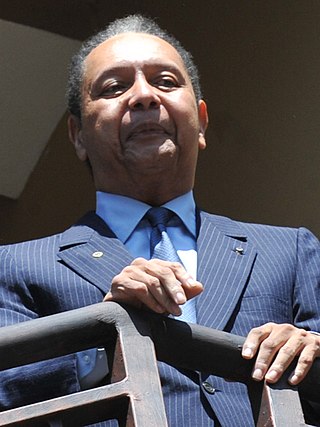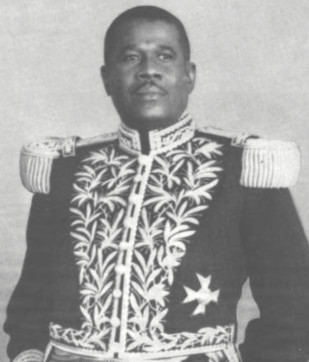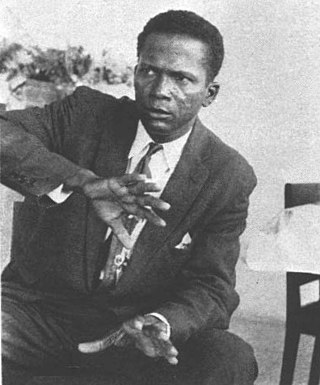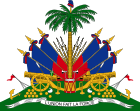The recorded history of Haiti began in 1492, when the European captain and explorer Christopher Columbus landed on a large island in the region of the western Atlantic Ocean that later came to be known as the Caribbean. The western portion of the island of Hispaniola, where Haiti is situated, was inhabited by the Taíno and Arawakan people, who called their island Ayiti. The island was promptly claimed for the Spanish Crown, where it was named La Isla Española, later Latinized to Hispaniola. By the early 17th century, the French had built a settlement on the west of Hispaniola and called it Saint-Domingue. Prior to the Seven Years' War (1756–1763), the economy of Saint-Domingue gradually expanded, with sugar and, later, coffee becoming important export crops. After the war which had disrupted maritime commerce, the colony underwent rapid expansion. In 1767, it exported indigo, cotton and 72 million pounds of raw sugar. By the end of the century, the colony encompassed a third of the entire Atlantic slave trade.

François Duvalier, also known as Papa Doc, was a Haitian politician and voodooist who served as the president of Haiti from 1957 until his death in 1971. He was elected president in the 1957 general election on a populist and black nationalist platform. After thwarting a military coup d'état in 1958, his regime rapidly became more autocratic and despotic. An undercover government death squad, the Tonton Macoute, indiscriminately tortured or killed Duvalier's opponents; the Tonton Macoute was thought to be so pervasive that Haitians became highly fearful of expressing any form of dissent, even in private. Duvalier further sought to solidify his rule by incorporating elements of Haitian mythology into a personality cult.

The government of Haiti is a semi-presidential republic, a multi-party system wherein the President of Haiti is head of state elected directly by popular elections. The Prime Minister acts as head of government and is appointed by the President, chosen from the majority party in the National Assembly. Executive power is exercised by the President and Prime Minister who together constitute the government. Legislative power is vested in both the government and the two chambers of the National Assembly of Haiti. The government is organized unitarily, thus the central government delegates powers to the departments without a constitutional need for consent. The current structure of Haiti's political system was set forth in the Constitution of March 29, 1987.

Jean-Claude Duvalier, nicknamed "Baby Doc", was a Haitian dictator who inherited the President of Haiti from 1971 until he was overthrown by a popular uprising in February 1986. He succeeded his father François "Papa Doc" Duvalier as the ruler of Haiti after his death in 1971. After assuming power, he introduced cosmetic changes to his father's regime and delegated much authority to his advisors. Thousands of Haitians were tortured and killed, and hundreds of thousands fled the country during his presidency. He maintained a notoriously lavish lifestyle while poverty among his people remained the most widespread of any country in the Western Hemisphere.
The Tonton Macoute or simply the Macoute, was a Haitian paramilitary and secret police force created in 1959 by dictator François "Papa Doc" Duvalier. Haitians named this force after the Haitian mythological bogeyman, Tonton Macoute, who kidnaps and punishes unruly children by snaring them in a gunny sack before carrying them off to be consumed for breakfast. The Macoute were known for their brutality, state terrorism, and assassinations. In 1970, the militia was renamed the Volontaires de la Sécurité Nationale. Though formally disbanded in 1986, its members continued to terrorize the country.

Paul Eugène Magloire, nicknamed Kanson Fè, was the Haitian president from 1950 to 1956.

Haiti's Constitution and written laws meet most international human rights standards. In practice, many provisions are not respected. The government's human rights record is poor. Political killings, kidnapping, torture, and unlawful incarceration are common unofficial practices, especially during periods of coups or attempted coups.

Pierre-Eustache Daniel Fignolé was a Haitian politician who became Haiti's provisional head of state for three weeks in 1957. He was one of the most influential leaders in the pre-Duvalier era, a liberal labor organizer in Port-au-Prince so popular among urban workers that he could call upon them at a moment's notice to hold mass protests, known as "woulo konpresè"—Haitian Creole for "steamroller."
Michèle Bennett is the former First Lady of Haiti and the ex‑wife of former President of Haiti, Jean‑Claude Duvalier. They fled to France together when he resigned in 1986; they divorced in 1990.

A constitutional referendum was held in Haiti on 14 June 1964 alongside general elections. The new constitution made President François "Papa Doc" Duvalier president for life, with absolute power and the right to name his successor. It also changed the country's flag from blue and red to black and red, with the black symbolising the country's ties to Africa.

A presidential referendum was held in Haiti on 30 April 1961 alongside parliamentary elections. Voters were asked whether President François Duvalier should remain in office for a further six years. The official count was 1,320,748 votes in favor of Duvalier and none against. The New York Times wrote that "Latin America has witnessed many fraudulent elections throughout its history but none has been more outrageous than the one which has just taken place in Haiti."

A constitutional referendum was held in Haiti on 30 January 1971. Before the referendum, the Haitian parliament had voted in favour of lowering the age limit for becoming president from 40 years to 20, as well as confirming Jean-Claude Duvalier, son of ailing dictator François Duvalier at 21 years of age, which would allow him to succeed his father.

The Anti-Duvalier protest movement was a series of demonstrations in Haiti from 23 May 1984 to 7 February 1986 that led to the overthrow of President Jean-Claude Duvalier and the Duvalier dynasty regime and the readoption of the original flag and coat of arms of the country.

On 28–29 July 1958, Alix "Sonson" Pasquet, accompanied by two fellow Haitian military officers and five American soldiers of fortune, attempted to overthrow Haitian President François Duvalier by seizing an army barracks in Port-au-Prince and rallying like-minded troops for an attack on the Presidential palace. Hoped-for support failed to materialize and all eight of the insurgents were killed by troops loyal to Duvalier.

The Duvalier family popularly known as Duvalier family was an autocratic hereditary dictatorship in Haiti that lasted almost 29 years, from 1957 until 1986, spanning the rule of the father-and-son duo Dr. François Duvalier and Jean-Claude Duvalier.

The Republic of Haiti from 1859 to 1957 was an era in Haitian history plagued with political struggles, the period of American occupation and multiple coups and elections until the Duvalier dynasty seized control of the country in 1957.

The National Unity Party is a right wing political party in Haiti. It was the de facto sole political party in the country during the Duvalier dynasty, the autocratic family dictatorship of François "Papa Doc" Duvalier and his son Jean-Claude "Baby Doc" Duvalier, which lasted from 1957 to 1986.

Parliamentary elections were held in Haiti on 14 June 1964, alongside a constitutional referendum. The National Unity Party of President François Duvalier was the sole legal party at the time, with all other parties having been banned the previous year.
Noirism is one of the main political and cultural movements which developed in Haiti after the end of U.S occupation. It built off of the movement which called for greater incorporation of local, Haitian culture into social and political life. Advocates of Noirisme, otherwise known as the Noiristes, believed that the most basic problem in Haiti is the rule of a minority, mulatto ruling class that uses the state to oppress the black majority and to maintain power. The Noiristes played a prominent role in shaping Haitian politics following the left-wing overthrow of President Élie Lescot. Their influence ultimately culminated into the election of Dumarsais Estimé as president in 1946, and the election of François Duvalier as president in 1957. Noirisme was then used during the Duvalier era to maintain support and legitimacy during an era of heavy repression.










